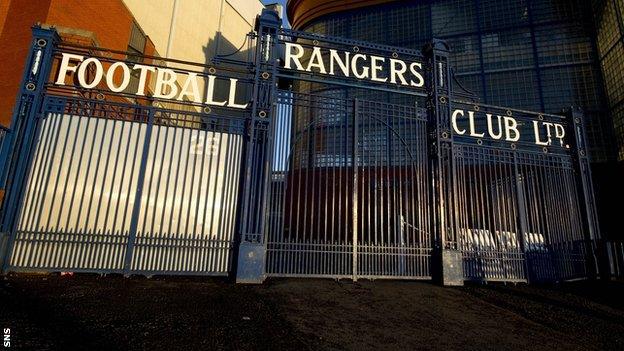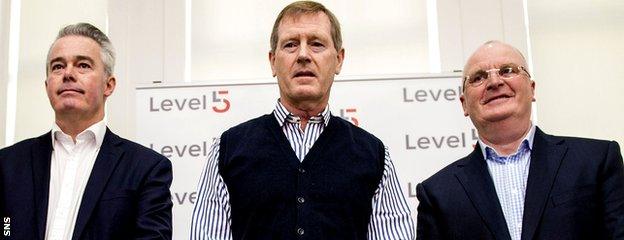Rangers: Key factors surrounding the extraordinary general meeting
- Published

Rangers' EGM will now be held at Ibrox
On 6 March, the board of Rangers International Football Club (RIFC) will hold an extraordinary general meeting (EGM) for the company's shareholders.
After two London hotels withdrew from staging the event, it will be convened at Ibrox, the club's home and the venue for the previous two annual general meetings.
It will probably be a short meeting, since there are now only six resolutions to be read out and voted on and no opening nor closing addresses.
It is, though, the culmination in a long battle for control of the club.
Here, BBC Scotland explains the EGM and the circumstances surrounding it.
What is the EGM about?
In its broadest sense, the future of Rangers; but, in pragmatic terms, control of the board.
The EGM has been called by Dave King, the former Rangers director who owns 14.5% of RIFC.

(left to right) Paul Murray, Dave King and John Gilligan
He originally raised seven resolutions: the removal of the board - chairman David Somers, chief executive Derek Llambias, finance director Barry Leach, and James Easdale - and the appointments of King, Paul Murray and John Gilligan. However, James Easdale has since resigned, citing a lack of support from fans as his reason for stepping down.
As far as the bigger picture is concerned, this can be framed as Mike Ashley versus 'the rest'. The former is the majority shareholder of Sports Direct and Newcastle United - and his MASH company owns an 8.92% stake in RIFC.
King is at the head of the latter, but he has clear and unambiguous support from fellow Rangers-supporting shareholders, ranging from ordinary fans with small holdings to Douglas Park, George Letham and George Taylor, who among them own 19.49% of RIFC shares.
Who are the key parties?
Ashley looms over the current regime. He wanted to increase his stake, in underwriting a share issue, but the Scottish Football Association paid heed to the spirit of its dual ownership guidelines and denied him permission.
Sports Direct has a joint retail agreement with Rangers and has lent RIFC £5m, secured against various assets, with a second tranche of £5m available to be drawn down. As part of this agreement, Sports Direct is entitled to appoint two directors until the loan has been repaid, but no new directors have been appointed.
Llambias is the former managing director of Newcastle United and, when he was appointed as a non-executive director, the Stock Exchange was informed by Rangers that this was on behalf of MASH. Leach left his executive role at Sports Direct to take up the position at Ibrox.

(left to right) Derek Llambias, Sandy Easdale, Barry Leach and James Easdale
Sandy Easdale is also part of this group, having supported the board appointments through his brother, James. Sandy Easdale owns 6.45% of RIFC and holds proxy votes for a further 19.67%, which includes the shares held by Blue Pitch and Margarita Holdings.
James Easdale's resignation could be interpreted as an acceptance by the current board that it does not have the backing of enough shareholders and that Ashley wants to focus on the retail agreement that Sports Direct has with the club. Ashley's company does still have the right to nominate two directors for the duration of the loan Sports Direct provided Rangers in January.
King was born and raised in Castlemilk before moving to South Africa early in his working life. He was a director of Rangers under Sir David Murray and then Craig Whyte, with his position on the board under the latter one of two issues that he faces in terms of 'fit and proper person' criteria.
After an 11-year battle with the South African Revenue Services, King was convicted of 41 breaches of the Income Tax Act - paying a cumulative fine of around £186,000 - and a tax bill of more than £40m.
King has said that he has a company lined up to act as RIFC's nominated advisor, which manages the company's listing on the Alternative Investment Market and will approve his appointment as a director. He would then need to seek the approval of the SFA's professional game board, having been on the Rangers Football Club plc board under Whyte when it was put into administration and due to his breaches of the Income Tax Act.
Recognising the increase in the shareholding by Rangers First, the fans' group that has purchased 2.25% of the stock, King said he is "excited about the prospect this offers to work, as partners, with the fan representatives immediately after the general meeting on the 6 March". The Rangers Supporters Trust has also purchased a further 450,000 shares to take its stake to 1,725,009 shares, representing 2.12% of the total shareholding. It also holds proxy votes for a further 2.28%.
Paul Murray is also a former director of Rangers and faces the same issue with the SFA, having been on the board under Whyte, albeit he was sacked by the former owner before RFC plc entered administration and had previously been very vocal about Whyte's unsuitability as an owner.

Newcastle United majority shareholder Mike Ashley also has a 8.92% stake in Rangers
A private equity investor, Murray has campaigned for proper corporate governance at Ibrox, becoming a thorn in the side of Charles Green and others who have passed through the boardroom in the past three years.
Gilligan is the former managing director of Tennents Caledonian Breweries and a former vice-chair of the Rangers Supporters Trust (RST).
There is a further block of powerful shareholders in Park, Letham and Taylor. The three offered to provide equity finance to RIFC earlier this year, but the board chose instead to take a loan from Sports Direct.
All three want to invest in the club and will vote for King's resolutions. They also called for the finance director, Barry Leach, to stand down following comments he made to the Rangers Fans Board, which were noted in minutes and released online, in which Leach said - in very uncomplimentary language - that they had been terrified when they thought their offer would be accepted.
Later, Rangers said: "These minutes have not been seen or approved by the board. We are very disappointed by the behaviour of the existing fans' board".
How do the votes stack up?
Votes are currently being cast by post or by proxy, but informed estimations can be made.
King is adamant that he will win and has the backing of his own 14.5%, the 19.49% held by Park, Letham and Taylor, River & Mercantile's 5.7%, Rangers Supporters Trust's 4.4%, Rangers First's 2.95%, Kieron Prior's 1.35%, Ally McCoist's 1.34%, Felix Magath's 0.99%, Graeme Henderson's 0.72%, Malcolm Murray's 0.25% and Walter Smith's 0.09%.
That gives King a starting point of 51.78%.
The board can count on MASH's 8.92%, Sandy Easdale's 6.45%, Blue Pitch Holding's 4.91%, Margarita Funds Holding's 3.19%, James Easdale's 0.7%, David Somers' 0.08%, and the remainder of Sandy Easdale's proxy, 11.57%.
That gives the board a starting point of 35.74%.
The floating voters?
The remainder of the shares - 12.48% - are held by a smattering of small investors and individual fan shareholders. The latter are thought to hold around 10% and many have been motivated to vote in advance by the board's attempts to hold the EGM in London.

Rangers are currently third in the Scottish Championship
The RST, in particular, and Rangers First have been gathering proxy votes and will cast them ahead of the EGM. Given the amount of proxies lodged so far, those votes alone could give King the backing of more than 50% of shareholder - and a straight majority is all that is required for resolutions to be passed.
It is conceivable that the board will be informed ahead of the EGM that King's resolutions have the required support, prompting the remaining directors to appoint the three and then resign.
What happens after the EGM?
Whichever side wins, there are clear and critical issues to address.
The first is finance, since the Sports Direct loan is short-term and the club needs rebuilding from top to bottom. It is also conceivable that the second £5m tranche from Sports Direct will be drawn down before the EGM, with additional securities.
If King wins, he will not seek the second tranche of finance. He will refinance himself and with the support of Rangers-fan investors,
The performance of the team also needs to be addressed, since Rangers' only likely route to the Scottish Premiership is now via the play-offs, with Hearts' lead looking unassailable and performances having sagged during the recent political strife.
- Published20 June 2016

- Published7 June 2019
